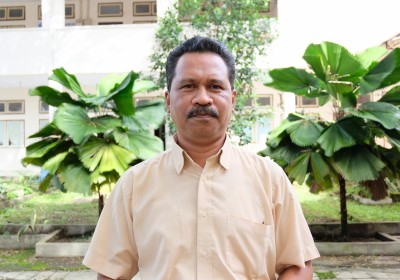Economy Expert: East Indonesia Requires Connectivity Infrastructure
June 28, 2018
The economy expert from Indonesian Christian Maluku University, Simon Pieter Soegijo
Lukas (32), a fisherman from Latola Besar village, Pulau Masela District, Maluku Barat Daya Regency, was joyful after the government constructed a road in his area. He said he was helped by the 34-km national road setup surrounding the 271.61-square meter Masela island.
”Beta (I) am very happy to have that nice road. I used to have taken a boat with long duration if I went to my family in Uiwili village. But now I only need to borrow my friend’s motorcycle to go there,” said Lukas as quoted from kumparan.com news portal, in Latalola Besar, Masela island, Maluku, Saturday, in April.
The infrastructure that was built by the Public Works and Housing Ministry has made it easier for locals to get around on a daily basis. They will pass through the street before distributing agriculture and livestock outputs.
Constructions of roads and other connectivity infrastructures are very much needed in Maluku. The economy expert from Indonesian Christian Maluku University, Simon Pieter Soegijo said that East Indonesia had different geographical condition compared to that of other regions thus requiring connecting infrastructures.
“Almost 98% of Maluku area is sea, and trans-island control span, cluster of one island to another’s is very hard to be accessed,” said Pieter during a meeting with Indonesia Development Forum 2018 team at the end of May.
Pieter said that the people of East Indonesia were spread in outer, remote islands and border areas. Distant control span between the central and East Indonesia has caused an apparent disconnected relation among the public, individuals and the government because of the enclosed information stream. Inter-regions connectivity is the main priority to bridge various information currents and other development necessities.
As such, Pieter hoped the government would prioritize building infrastructure projects, like transportation, communication and basic facilities, in isolated areas. These infrastructures will make it easier for the public to get access and elevate existing potentials among locals to spur new economic centers.
Aside from infrastructure, Pieter said local administration needed to upgrade the capacity hence they would be capable of knowing development problems in the society. The abilities can be improved through education and training, or even via participation either in local or national forums.
“For instance, Indonesia Development Forum, this forum can be an option for the Maluku Administration or other provinces to give thoughts, recommendations according to policy research results for public development,” said Pieter.
IDF 2018 is a forum held by the National Development and Planning Agency or Bappenas and is supported by the Government of Australia through Knowledge Sector Initiative (KSI). IDF 2018 drives accelerated development in Indonesia to be more equal and more sustainable based on knowledge, experience and fact.
This year, IDF takes a theme of “Pathways to Tackle Regional Disparities across the Archipelago”. One of the sub-themes is Connecting the Archipelago. The result of the IDF 2018 will be used as materials to compose National Medium Term Development Plan 2020-2024.
As taken from the official website Presiden.go.id, President Joko Widodo said current infrastructure developments were no longer Java-centric, but Indonesia-centric. Trans Kalimantan, Trans Sumatra, Trans Papua roads are examples of established infrastructures to accelerate mobility of people and goods thus prices of staple foods are lower in various areas in Indonesia.
“Building from the skirts, from outer islands, that is because the regions really need that. We build to narrow infrastructure gap among West, Central and East Indonesia,” said President Jokowi in front of the Regional Representatives.**
Indonesia’s Research Institutions Supporting the Development of the Electric Vehicle Industry
Indonesian Muslim Fashion and Cosmetics IKMs Shine at Dubai World Expo 2020
Govt Steps Up UMKM Transformation Efforts in the Midst of Pandemic Slowdown
Govt Encourages Promotion of IKM Products in Digital Era
Government Begins Developing Maritime Training Center in Makassar
Tweets by IDDevForum
